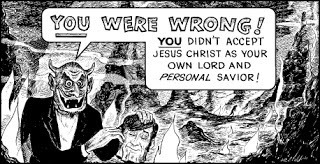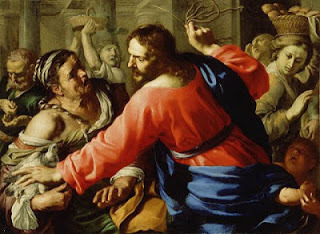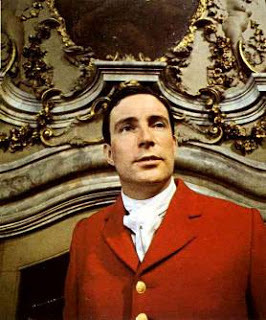Dwight Longenecker's Blog, page 298
March 12, 2012
Keep Talking
Thomas Peters reports evidence that those who are opposed to the WH mandate are winning the argument, and encourages all those with a media voice to keep up the pressure. More and more voices are pointing out that the Catholic bishops are not trying to ban contraception or force anything on anybody. All we want is the freedom to obey our consciences and not pay for something which goes against our conscience. More and more commentators are pointing out that free (or very inexpensive) contraception is already available all over the place.
So it's not really about contraception. It's about getting the Catholics out of health care.

So it's not really about contraception. It's about getting the Catholics out of health care.
Published on March 12, 2012 14:19
Time to Quit the Chick Tracts

Has anybody noticed that the style of the cartoons illustrating the 'Time to Quit the Catholic Church' ad in the New York Times is remarkably similar to the artwork in Chick Tracts?
What's curious about the current wave of anti-Catholic paranoia in our country is that it uses much of the same scare tactics, exaggeration, bigotry, distortion of truth and downright lies that have been used for a long time by the fundamentalist Protestants.
The New Anti Catholicism--The Last Acceptable Prejudice by Philip Jenkins--goes through this in great detail. He chronicles how the present anti Catholicism has its roots in Puritan America, the Know Nothing riots, and anti-Catholic legislation.
It should not surprise us that the present atheistic, secularist anti Catholic gangs are using the same tactics as the Protestant fundamentalists, because at the very root of both movements is not only a hatred of the Catholic Church, but the same philosophical decay. Secular, atheistic anti Catholicism is merely the end point of Protestantism. It is, if you like, the retarded child of Protestantism.
Protestantism has at its roots, the philosophy of nominalism--that universals do not exist--just the particulars. The result of this is materialism, individualism and subjectivism. There is no universal objective truth. Instead all that matters is the individual and the particular.
For Protestants this means that only the personal experience is relevant. The end point of this is relativism--that there is no such thing as objective truth, and the end point of this is the secular materialist position--in which all that matters is my own judgement and what you can see here and now.
For both Protestants and secular materialists the idea that there is some over arching law or Almighty lawgiver which mankind must obey--is absurd. That there is an earthly institution that claims to be the channel of communication for that lawgiver is an outrage.
Of course, I am talking about foundational principles here and making generalizations. There are plenty of good Protestants who believe in God and an objective moral law that is communicated through the Bible. The point I am making, however, is that their intrinsic antipathy to the Catholic Church (even when the use polite ecumenical type language) is rooted in the same philosophical assumptions which drive the more rabid anti Catholicism or the radical Protestants and secular materialists.
No wonder therefore, that the NY Times ad looks like a Chick Tract.
Published on March 12, 2012 14:06
March 10, 2012
Cleansing the Temple

Do you know why the commerce in the temple was so bad? Not because you shouldn't sell stuff in church. It's because the Jews had to make sacrifice in the temple in Jerusalem. It couldn't happen anywhere else. Furthermore, they had to sacrifice animals that were perfect. So here is what happened:
Good Jewish man comes to temple gates to sacrifice the little lamb he thought was perfectly acceptable. The temple guard checks it out..whoops it has a defect. He has to buy one of the approved ones which they have already inspected in the temple courtyard.
So your Jewish worshipper goes to buy his sacrificial lamb, but he's not allowed to use the Roman currency because it has an image of the emperor on it which is a graven image and that would be blasphemous to bring into the temple, so he has to change the Roman money to Jewish shekels, which can only be done--you guessed it--at the official money changer table.
So he goes to change his money to buy his lamb to make his sacrifice and finds out that, too bad, the exchange rate is not so good and also the money change makes a commission on each transaction.
No wonder Jesus was hopping mad. They were making a killing out of the poor Jewish faithful who, by their own religious rules, had to make a sacrifice in that place in that way approved by those people who were all getting rich on it.
Published on March 10, 2012 12:01
Death, Slavery and the Pursuit of Blessedness
I was feeling grumpy and anti-American yesterday because it was a Friday in Lent, but also because sometimes I get exhausted with the whole grinning, plastic society that much of America has become.
I read a letter from someone in a Catholic leadership position who was saying something like, "We need to ask ourselves the question whether we have truly found what will make us truly happy." What is that all about? Where on earth in the gospel is the idea that Jesus and the Catholic faith are supposed to make us happy?
This is Catholicism adapting to the American way which is all about "life, liberty and the pursuit of happiness." The problem is that Americans are so intent on the pursuit of happiness that they are now willing to sacrifice life and liberty in order to attain it.
Forgive me if I criticize this most venerable shibboleth of being American, but this phrase has now been taken out of its historical context and has come to mean something very different. Initially "life, liberty and the pursuit of happiness" meant that Americans were free to live and pursue their own happiness no longer enslaved to economic and political overlords. That's fine. I understand this.
There was also a sense of priority in the three ideals. Life was first. Liberty was second. The pursuit of happiness was third. That means that the third is subservient to the second and the first and the second is subservient to the first. In other words, your pursuit of happiness is only possible because you have liberty and you only have liberty because you have life. Furthermore, your personal pursuit of happiness takes a back seat to your defense of liberty and your defense of life.
Here's an example: if you have to defend your liberties and your country you might have to go to war and get wounded or killed which runs contrary to your personal pursuit of happiness. Likewise you may have to give up your pursuit of happiness or your liberty in order to preserve and defend human life.
Our perverse society in America has now reversed the order completely. Pursuit of happiness comes first, and this is not even pursuit of the classical definition of happiness which might mean the greatest good for the greatest number or even the kind of happiness attained by the Stoics or Epicureans in which happiness was only attained after a life of discipline and refinement. Instead 'happiness' means entertainment, licentiousness and general vulgarity--and liberty and life will serve whatever pleasures we think we want.
As this blog is called Standing on My Head, allow me to stand this American phrase on its head and say that perhaps as Lenten Christians we should stand instead for Death, Slavery and the Pursuit of Blessedness. In other words, to truly live the abundant life we must die to self. In order to attain true liberty and freedom we must become a slave to Christ, and this may not lead to happiness, but it will lead to blessedness--which is something far more eternal and profound.
Not a cheerful message perhaps--but this in Lent you know!
I read a letter from someone in a Catholic leadership position who was saying something like, "We need to ask ourselves the question whether we have truly found what will make us truly happy." What is that all about? Where on earth in the gospel is the idea that Jesus and the Catholic faith are supposed to make us happy?
This is Catholicism adapting to the American way which is all about "life, liberty and the pursuit of happiness." The problem is that Americans are so intent on the pursuit of happiness that they are now willing to sacrifice life and liberty in order to attain it.
Forgive me if I criticize this most venerable shibboleth of being American, but this phrase has now been taken out of its historical context and has come to mean something very different. Initially "life, liberty and the pursuit of happiness" meant that Americans were free to live and pursue their own happiness no longer enslaved to economic and political overlords. That's fine. I understand this.
There was also a sense of priority in the three ideals. Life was first. Liberty was second. The pursuit of happiness was third. That means that the third is subservient to the second and the first and the second is subservient to the first. In other words, your pursuit of happiness is only possible because you have liberty and you only have liberty because you have life. Furthermore, your personal pursuit of happiness takes a back seat to your defense of liberty and your defense of life.
Here's an example: if you have to defend your liberties and your country you might have to go to war and get wounded or killed which runs contrary to your personal pursuit of happiness. Likewise you may have to give up your pursuit of happiness or your liberty in order to preserve and defend human life.
Our perverse society in America has now reversed the order completely. Pursuit of happiness comes first, and this is not even pursuit of the classical definition of happiness which might mean the greatest good for the greatest number or even the kind of happiness attained by the Stoics or Epicureans in which happiness was only attained after a life of discipline and refinement. Instead 'happiness' means entertainment, licentiousness and general vulgarity--and liberty and life will serve whatever pleasures we think we want.
As this blog is called Standing on My Head, allow me to stand this American phrase on its head and say that perhaps as Lenten Christians we should stand instead for Death, Slavery and the Pursuit of Blessedness. In other words, to truly live the abundant life we must die to self. In order to attain true liberty and freedom we must become a slave to Christ, and this may not lead to happiness, but it will lead to blessedness--which is something far more eternal and profound.
Not a cheerful message perhaps--but this in Lent you know!
Published on March 10, 2012 11:48
Been Busy

Sorry not much blogging this week. Things at Our Lady of the Rosary parish have been very busy, and I am in Providence, RI this week to preach a Lenten mission at Blessed Sacrament parish.
In the parish we are busily engaged in the capital campaign to build our new church--pictured here. The people of the parish have been trying to build their church for twenty years, and have raised a good amount of money so far, but we still have a long way to go.
The first phase of this campaign is a round of targeted visits in the parish to get us to the next threshold. Then another round of visits in the parish before we go into phase two--which will be a whole range of creative fund raising events. We hope this will get us to the point of commissioning the construction drawings and breaking ground.
Phase three will continue the fund raising to pay off the new building and finish the decoration and artwork that will go inside. It will also include the construction of a shrine to the Divine Mercy in the crypt of the new church.
Can you help? Here's how: take some time to learn more about our exciting church construction project. Go to the OLR website and read my articles on sacred architecture, meet the designers and talk up the project.
Tell people about our new church. Link to this post on your blog or link to the articles on architecture and talk it up. Put the pictures of the church on your blog or facebook page and talk it up. Publicity will help bring this project to the attention of those who will have the finances available to make a large donation.
And by the way, you can also make a big donation yourself if you want! The OLR website will take you to ParishPay, or you can send me an email to discuss now you can donate or make a pledge.
Published on March 10, 2012 04:01
March 5, 2012
Judging like Bridey?

What's the favorite Bible verse of the liberal? "Judge not that ye be not judged."
There are a couple of problems when people start bashing you with this verse. Here's the first--usually what they mean is, "I want to do whatever I want to do and you have no right to tell me that it's wrong."
They miss the obvious hypocrisy that they are judging you for being judgmental, but we'll let that slide...
The liberal whine about people being judgmental has beneath it a sandy foundation of relativism--that there is no right and wrong, and what the relativist can't really understand is that it is possible to judge actions and beliefs without judging the person who holds them.
If a person says, "I'm a Christian, but I don't believe that Jesus rose from the dead." I can judge their beliefs. They are not actually a Christian. They are a heretic. That's just an objective call. The same is true of moral actions. "I'm living with my boyfriend" says a young girl. When you object she cries, "You're being judgemental!!"
That's right. Like I'm judging the heretic's beliefs, I'm judging your actions. They are immoral according to the teaching of the Catholic Church.
What I'm not doing is judging you. That is, I'm not judging the state of your mortal soul. I don't know if you're damned or not. To say you're going to hell would be to make a judgement. That's for God to do.
Catholics should be the most objective about this because we have clear teaching both doctrinally and morally. We should be able to say quite honestly and openly that someone is "living in sin" if they are or that someone is "a heretic" if they are. It doesn't mean we have to be mean to that person or shun them or be constantly disapproving.
We might have to distance ourselves if we have the consciences of young children to protect, but we are tolerant. We let them make their own decisions. We don't impose a way of life on them. We don't rant and holler and blow and have steam coming out our ears. We make the objective call and leave the rest to God.
I'm not an admirer of Bridey--the prig of a brother in Brideshead Revisited, but we can at least admire his objectivity. He understood mortal sin. He understood the objectivity of Catholic theology and moral teaching. What he lacked, however, was mercy.
Mercy is the quality that allows us to judge an action or a belief and yet still embrace and love the person who has made the mistake. The point of today's gospel is that everyone deserves that mercy. There is usually more than meets the eye. There may be circumstances and intentions that mitigate the guilt. There may be ignorance and inability that inhibits grace. There may be good reasons for the person's error or sin.
Everyone deserves to be given the benefit of the doubt, and if we don't grant others mercy...
...we will be denied that mercy ourselves.
Published on March 05, 2012 14:15
Tweets
Click on the box in the left sidebar to follow me on twitter. I tweet pithy comments, theological riddles and interesting links.
Published on March 05, 2012 08:29
March 4, 2012
Transfiguration

Do you like this portrayal of the Transfiguration? If not, why not?
A better question: Is it Christian art? If so why. If not why not?
Another question: Could this be Christian art, yet not be within the iconographic tradition? If so why? If not, why not?
Is "Beauty in the eye of the beholder"? Is so why? If not why not?
Informed opinions in the combox.
Just saying, "I don't like that kind of crap" may reveal more about you than the art in question. Just sayin'...
Published on March 04, 2012 09:20
March 3, 2012
Worcester Men's Conference
I'll be speaking at the Worcester Diocese Men's Conference on March 24. Y'all come!
Published on March 03, 2012 07:48
Dwight Longenecker's Blog
- Dwight Longenecker's profile
- 80 followers
Dwight Longenecker isn't a Goodreads Author
(yet),
but they
do have a blog,
so here are some recent posts imported from
their feed.



